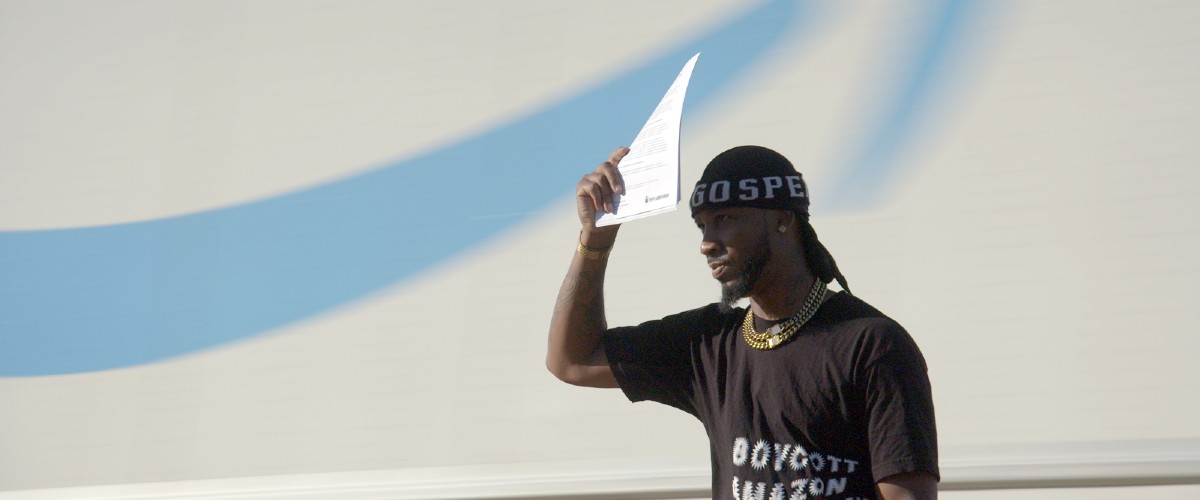Movie Reviews
Movie Review | Tom Blyth, Rachel Zegler shine in latest ‘Hunger Games’ movie

“The Hunger Games: The Ballad of Songbirds & Snakes” is to its hugely popular universe what “Star Wars: Episode I — The Phantom Menace” is to a galaxy far, far away, but with a couple of key differences.
First, “Ballad” does not appear to be the first in a trilogy of prequels set in the dystopian world created by author Suzanne Collins but instead a stand-alone story.
Also, it’s a better movie.
Instead of the backstory of fallen Jedi Anakin Skywalker, we get the origin of Coriolanus Snow, future tyrannical president of Panem and persistent thorn in the side of “Hunger Games” franchise protagonist Katniss Everdeen. The world may not have been clamoring for a tale built around a pivotal chapter in the life of Coriolanus, but the 2020 novel from which this movie is adapted was well-received.
The screen version illustrates why, as it is a reasonably compelling narrative about a conflicted young man, a man torn between his ambitious nature and his moral compass and feelings for a charming and beautiful young woman.
After a brief prologue featuring Coriolanus as a boy during the Dark Days, precisely three years before the first Hunger Games, we move ahead to catch up with the 18-year-old version (Tom Blyth). His deceased father once a powerful man in Panem’s Capital, Coriolanus now lives with cousin Tigris (Hunter Schafer of “Euphoria”) and their Grandma’am (Fionnula Flanagan, “Waking Ned Devine”) in a meager home. When he’s among his classmates at the Academy, Coriolanus does his best to project that he still comes from wealth, like the rest of them.
Right before the Reaping ceremony for the upcoming 10th Hunger Games, in which the “tributes” from Panem’s various districts will be chosen for the fight-to-the-death tournament, Coriolanus and other students learn they will be serving as mentors to those future combatants. He becomes the mentor for Lucy Gray Baird (“West Side Story” star Rachel Zegler) of District 12 — which, several decades later, will produce Katniss for the contest.
Coriolanus, as well as everyone else who watches her selection, is taken by Lucy Gray’s impromptu singing, which will become a constant (and welcome) occurrence throughout the movie.
If she wins the Hunger Games, it could be great for the aspiring Coriolanus, who has a nemesis in the Academy’s dean, Casca Highbottom (Peter Dinklage), but a potential champion in Dr. Volumnia Gaul (Viola Davis), an Academy instructor and the head gamesmaker.
However, Coriolanus develops feelings for Lucy Gray, which are heightened after he sneaks aboard a truck carrying her and other tributes to the Capital Zoo, where they are kept behind bars until they are faced with killing one another.
As the story continues, the pair — both orphans, he proudly wears his father’s dress shirt and she finds comfort in being in her mother’s dress — grow closer, and Coriolanus does all he can to help her survive. The Hunger Games are far from the elaborate, high-tech affair they will become in 60-plus years, but they’re just as dangerous given the stakes, and Lucy Gray isn’t exactly the out-for-blood type, so she’ll need some assistance.
Another key player in Coriolanus’ story is classmate and friend Sejanus Plinth (Josh Andrés Rivera, another “West Side Story” alum), who comes from a powerful family but yearns for great change in how the opulent Capital oppresses the poverty-plagued districts. Coriolanus also finds himself protecting Sejanus, but the latter’s actions make that increasingly difficult.
Told in three parts, “Ballad” probably is a little longer than it needs to be at about two and a half hours, and yet it still rushes through its all-important final few minutes.
That aside, it is fairly well told by screenwriters Michael Lesslie (Assassin’s Creed”) and Michael Arndt (“Hunger Games: Catching Fire”), the script holding little nods to the existing saga that fans will appreciate.
That the film is deftly directed by Francis Lawrence is hardly surprising given that he helmed all but the first of the original four “Hunger Games” entries. He understands Collins’ world and always seems confident and comfortable when conducting the goings-on within it.
Franchise producer Nina Jacobson and others responsible also did well with the casting of its leads.
A lot is asked of Blyth (“Billy the Kid”) as Coriolanus: He must make the character likable while infusing him with qualities that allow the viewer to believe he could become the future authoritarian we know and loathe. (It doesn’t hurt that, at least if you squint, you can picture Blyth becoming Donald Sutherland-esque in his later years.)
And Zegler is a no-brainer choice for Lucy Gray, the actress lighting up the screen, just as she does in 2021’s “West Side Story,” and enhancing the proceedings with her lovely singing voice. (Don’t be surprised if, after seeing “Ballad,” you find yourself spending a good bit of time with its soundtrack thanks to the movie’s many enjoyable songs.) Zegler also brings a hint of mystery to the character, as well, which helps make the whole formula of this romance work.
Effective comic relief is provided by Jason Schwartzman’s (“Asteroid City”) Lucretius “Lucky” Flickerman, host of the Games’ TV broadcast — and Panem weatherman — and an ancestor of Stanley Tucci’s Caesar Flickerman.
On the other hand, while they are excellent actors, Davis (“Fences”) and Dinklage (“Game of Thrones”) aren’t all that impactful in portraying their rather uninteresting characters. Gaul calls for the former to go way over the top, wild hair and all, and it’s not where the Academy Award winner excels, while Highbottom is a bit of a bore.
Although Coriolanus’s fall to the dark side is better executed than Anakin’s in the “Star Wars” prequel trilogy, it’s nice to think that his story now has been told.
The guess here is Collins at some point will return to her fertile world for another novel — later resulting in another movie — but that she’ll make a game of another aspect of it.
“The Hunger Games: The Ballad of Songbirds & Snakes” is rated PG-13 for strong violent content and disturbing material. Runtime: 2 hours, 37 minutes.

Movie Reviews
'Killer Heat' movie review: A mystic mystery

Philippe Lacôte’s Killer Heat is a suspense thriller set on the tranquil island of Crete, Greece. The island’s stunning landscape, with rugged mountains and pristine beaches, creates the perfect setting for this atmospheric mystery. Initially, the film may feel too laid-back for its own good, but as the plot unfolds, it finds its groove, delivering a cohesive, engaging story. Much like its setting, Killer Heat is refreshingly straightforward, avoiding a forced sense of suspense. The mystery unravels at a measured pace, allowing the viewer to savour the journey.
The plot itself may not break new ground, with relatively low stakes, but what makes it work is the absence of unnecessary storytelling shortcuts. Joseph Gordon-Levitt plays Nick Bali, a private investigator hired to look into the mysterious death of Leo (Richard Madden), the heir of the wealthy Verdakis family.
The film opens with Leo climbing a cliff while Bali narrates the Greek myth of Icarus, the man who flew too close to the sun. Leo soon falls to his death, and the family—except for Leo’s sister-in-law, Penelope (Shailene Woodley)—considers it a tragic accident.
Penelope, however, is convinced otherwise, refusing to trust the local police, claiming her “family owns them”, and that “in Crete, no one goes against the gods”. The film’s integration of Greek metaphors adds a touch of mysticism.
What’s refreshing about Killer Heat is that it doesn’t trick the audience. From the first scene, it’s clear that the culprit isn’t an outsider, but that doesn’t take away from the suspense.
Movie Reviews
Union movie review & film summary (2024) | Roger Ebert

When Amazon workers on Staten Island successfully voted to unionize in the spring of 2022, becoming the corporate retailer’s first American workplace to do so, it was hailed as one of the most important labor victories in the United States in nearly 100 years.
For the Amazon Labor Union (ALU) to organize employees at the JFK8 warehouse to vote in favor of union representation was a David versus Goliath story for the age of globalization — and a rousing reminder that collective grassroots efforts can still succeed despite massive employer concentration, management intimidation, and other hindrances to building worker power. And that an independent, worker-led coalition led the drive at this 8,000-plus-employee facility, rather than an established union, made its victory all the more impressive, even as the vote to unionize brought organizers into uncharted territory and set up a protracted legal battle with Amazon, which has since refused to recognize the ALU or negotiate a contract.
Telling the story of how the ALU reached this historic moment, “Union,” a new documentary co-directed by Brett Story (“The Hottest August”) and Stephen Maing (“Crime + Punishment”), takes a detail-driven, ground-level approach, following current and former Amazon employees in Staten Island as they mount a grassroots worker-to-worker campaign, standing their ground against one of the world’s powerful corporations all the while.
No talking-head documentary but a keenly observational chronicle of the unionization push and its aftermath, “Union” often plays like a thriller by virtue of its sharp, smart editing rhythms. Early on, Story and Maing juxtapose Jeff Bezos blasting off into space on a rocket made by his Blue Origin company and Amazon workers trudging wearily into work; it captures the unimaginable scale of the company’s operations while foregrounding the human scale often concealed by breathless (yet inevitably compromised) reporting of Amazon’s designs on empire.
Made over the course of three years, Story and Maing’s film explores the human cost of the convenience economy and illuminates oppressive working conditions in Amazon’s factories. From constant surveillance to high injury rates and a lack of breaks, the pressures of working in Amazon warehouses compound to create punishing environments for workers, ones Amazon has steadfastly refused to address or even accurately report. And the threat of retaliation against workers who organize is ever-present; in addition to pouring hundreds of millions of dollars into union-busting campaigns that include mandatory “captive audience” meetings (which have since been banned in the state of New York), Amazon issues warnings of possible termination to workers involved with the unionization drive.
Bookended by footage of vast cargo ships transporting goods, a reminder of the slow, perpetual motion with which the gears of modern capitalism grind on, Story and Maing’s film is smart in how systematically its narrative lays out obstacles to the union’s success. It also insightfully depicts ground-level dialogue between workers as a powerful tool with which to overcome them. Some of the most remarkable footage, inside Amazon headquarters, covertly films one of those captive audience meetings; here, the company’s anti-union propaganda (One reads: “We’re asking you to do three simple things: get the facts, ask questions and vote no to the union”) is disrupted by ALU organizers, who successfully push back on Amazon managers just long enough to make their case to workers.
One of the ALU organizers, Chris Smalls, takes center stage in “Union,” though the documentary largely sidesteps the temptation to cast him as a conquering hero. (That’d be an easy trap, given that he became the organization’s public face across the period “Union” depicts.) Smalls, fired from Amazon after protesting inadequate PPE provision during the pandemic (and besmirched by the company’s general counsel as “not smart or articulate” in an internal meeting of executive leaders), is a father of three who was moved to activism by the flagrant injustice of the company’s abusive labor practices. As a leader, he’s at once charismatic and hard-charging, dedicated to his fellow “comrades” but ever driven to push forward even in the face of inter-union dissent.
One of the film’s great strengths is its ability to surface the multiplicity of tensions between organizers working toward a shared cause. Take the world of difference separating the experiences of two subjects: Maddie, a white college graduate using her campus activism experience to help the cause, and Natalie, an older Latina woman living out of her car for years. In one charged exchange, Natalie pushes back on the suggestion, made by white male organizers, that Chris intentionally gets himself arrested by New York police officers to draw attention to the unionization drive. Ultimately, Natalie’s dissatisfaction with the ALU—due to her disagreements with leadership as much as her desire to wait for larger union support—leads her to leave the organization. It’s a testament to the complexity of individual motivations and the absence of easy triumph in this type of effort.
“Union” documents the internal debates and disagreements over governance, organizing, and leadership strategies that divided the ALU before its successful unionization vote and were compounded by its subsequent failed attempt to unionize a second warehouse. Though Smalls’ force of personality, passion, and determination fueled the fight to unionize JFK8, the film carefully depicts this as a collective victory. It rarely gives in to the temptation to single out Smalls for praise at the expense of others, and making it clear that his leadership style also contributed to internal rifts in the ALU that at various points may have weakened its ability to further the union’s mission.
This becomes particularly important in the film’s latter half, after the unionization vote, at which point the sobering realities of the long work ahead come more fully into view. The heroism of the ALU organizers will never be in question. But with only one battle won in the war for workers’ rights, and Amazon continuing to contest or undercut its results by every means available, “Union” concludes on a note of weary fortitude rather than declarative victory. The film captures both the pain and the power of people at the base of a global infrastructure. By not departing from the frontlines of the fight against Amazon’s labor exploitation, Story and Maing bring the true face of their struggle into focus.
“Union” will be self-distributed theatrically, starting on Oct. 18. This review was filed from the film’s New York premiere at the New York Film Festival.
Movie Reviews
CTRL movie audience review: Ananya Panday’s Netflix thriller is ‘terrific’; OTT film gets thumbs-up from viewers | Today News

CTRL movie audience review: CTRL started streaming on Netflix on October 4. The thriller, directed by ace Bollywood director Vikramaditya Motwane, stars Ananya Panday and Vihaan Samat.
The story is about Nella and Joe, who seem like the ideal influencer couple. However, when Joe cheats on Nella, she uses an AI app to erase him from her life — only for it to gain control over her.
The Netflix movie has received some highly-positive reviews from viewers, who posted their comments on social media. Let’s take a look at some of those.
CTRL public reviews
“CTRL is… terrific, absorbing and made with a lot of finesse… Do watch if you have time.”
“Found Vikramaditya Motwane’s new Netflix film #CTRL utterly fascinating. So much to admire. An ambitious, timely, deeply uncomfortable screenlife thriller that’ll make you want to change your passwords, cover your webcam and move to the hills.”
“This is quite good. Only 1 hour 40 minutes, and not gonna lie, I had underestimated Motwane a bit with this movie. Ananya did well because she nailed this genre. It starts off slow, happy, and lighthearted, but the tension builds as the story progresses. Give it a watch, it’s nice.”
“vikramdityamotwane Gives a nuanced and gripping narrative and @ananyapandayy has finally come into her own, and does a fine job.”
“As a big fan of Motwane’s films, I’ve always seen him set new standards in mainstream cinema. From Udaan to AK vs AK he has always proved his merit. However, #CTRL feels like just an okay film, despite good casting with Ananya Panday. It lacks a strong impact and becomes somewhat preachy about our relationship with technology, leaving you with little to think about afterward.”
“The movie is abt how social media, AI and corporates are controlling us and not vice versa. Ananya Panday is good. Vihaan Samat is brilliant. The movie cudve been much better. Esp the climax.Theres no closure!”
-
/cdn.vox-cdn.com/uploads/chorus_asset/file/25439572/VRG_TEC_Textless.jpg)
/cdn.vox-cdn.com/uploads/chorus_asset/file/25439572/VRG_TEC_Textless.jpg) Technology3 days ago
Technology3 days agoCharter will offer Peacock for free with some cable subscriptions next year
-

 World2 days ago
World2 days agoUkrainian stronghold Vuhledar falls to Russian offensive after two years of bombardment
-

 World3 days ago
World3 days agoWikiLeaks’ Julian Assange says he pleaded ‘guilty to journalism’ in order to be freed
-

 Technology2 days ago
Technology2 days agoBeware of fraudsters posing as government officials trying to steal your cash
-

 Virginia4 days ago
Virginia4 days agoStatus for Daniels and Green still uncertain for this week against Virginia Tech; Reuben done for season
-

 Sports1 day ago
Sports1 day agoFreddie Freeman says his ankle sprain is worst injury he's ever tried to play through
-

 Health13 hours ago
Health13 hours agoHealth, happiness and helping others are vital parts of free and responsible society, Founding Fathers taught
-

 News14 hours ago
News14 hours agoLebanon says 50 medics killed in past three days as Israel extends its bombardment














